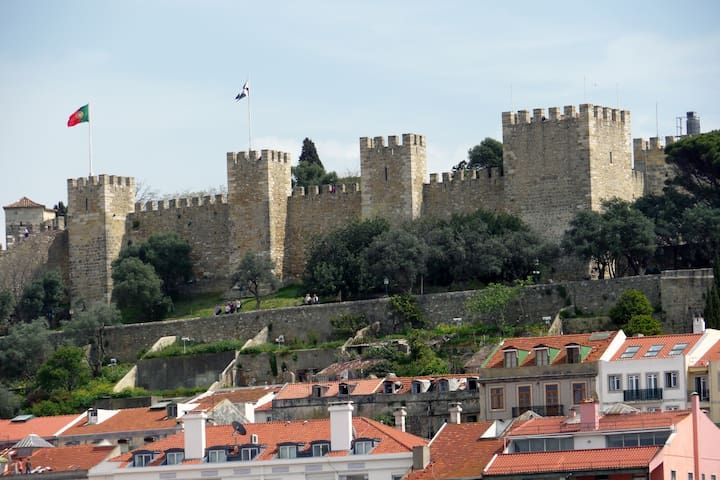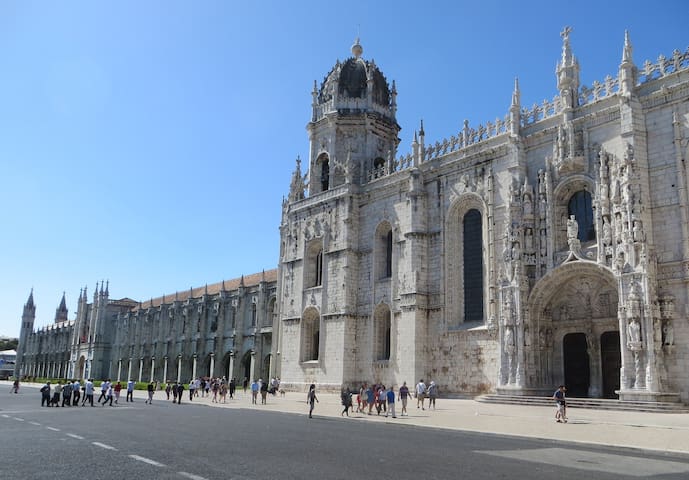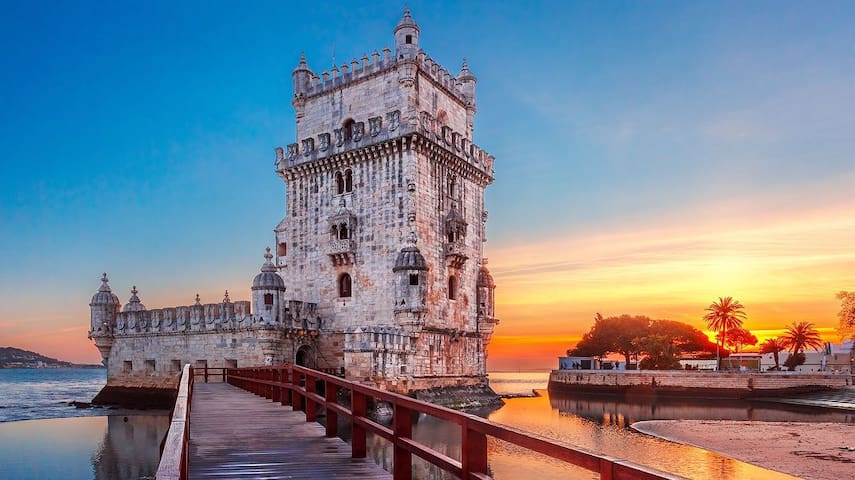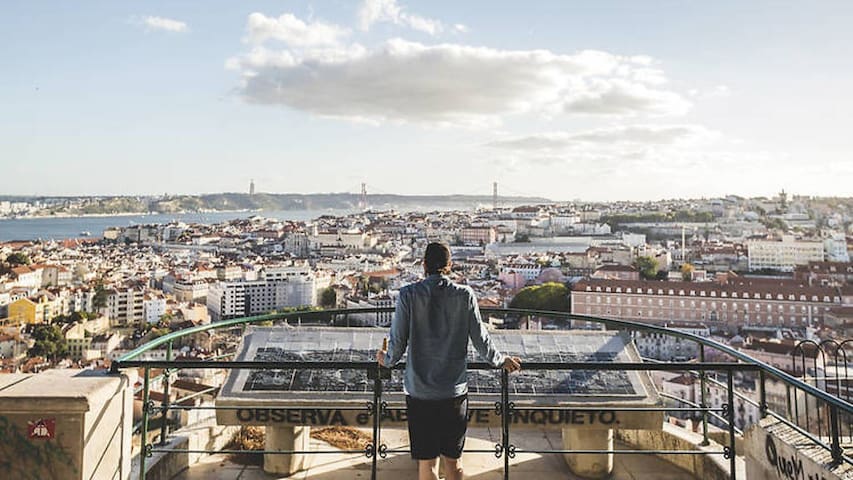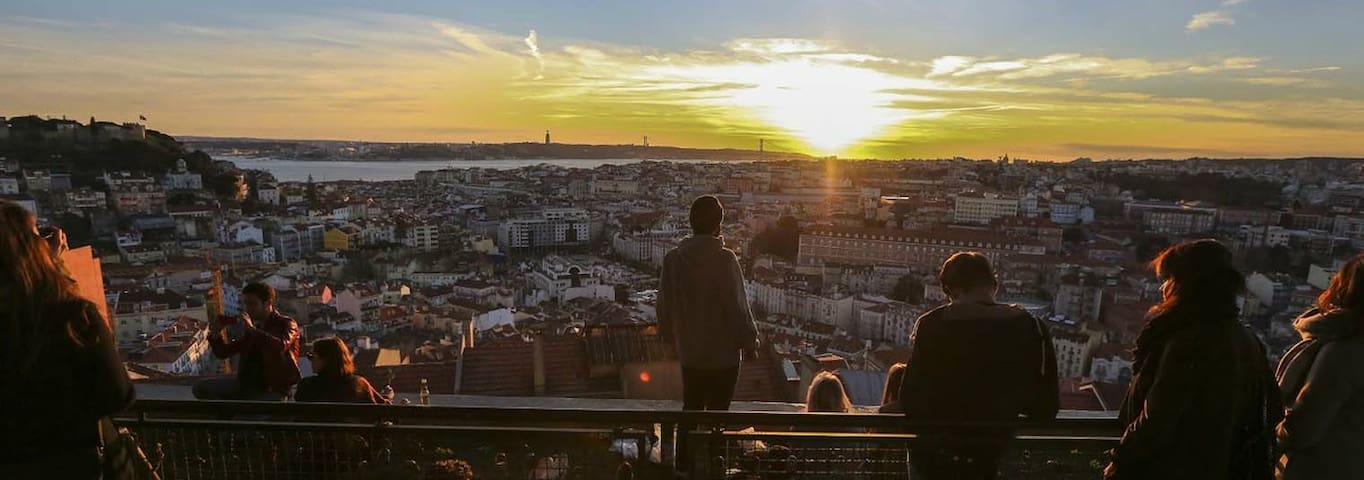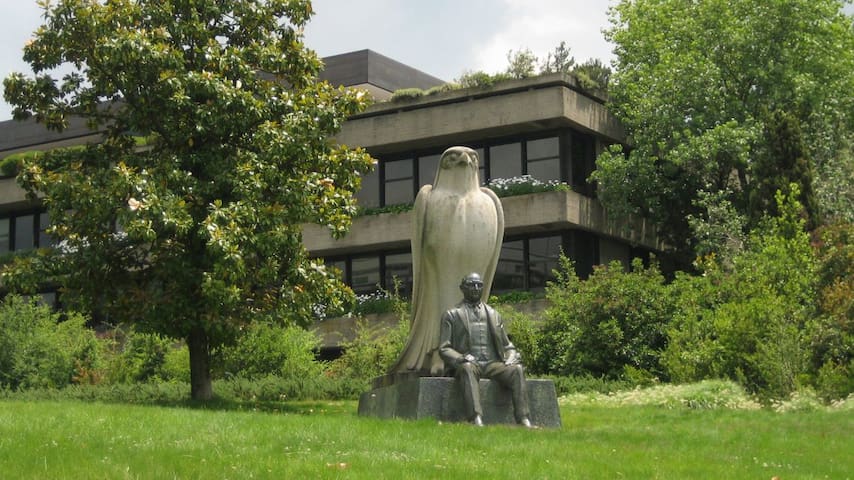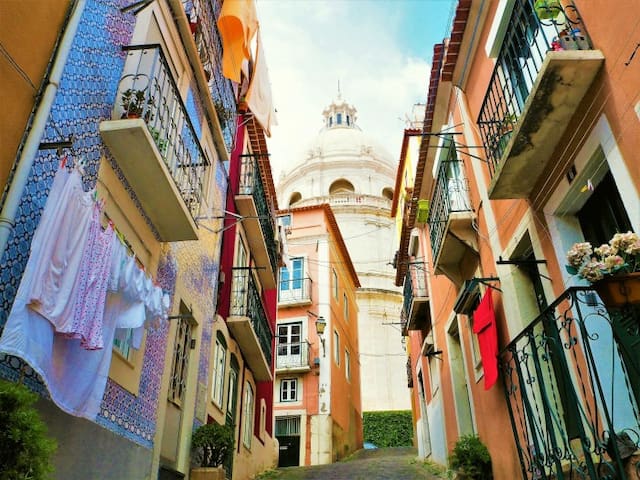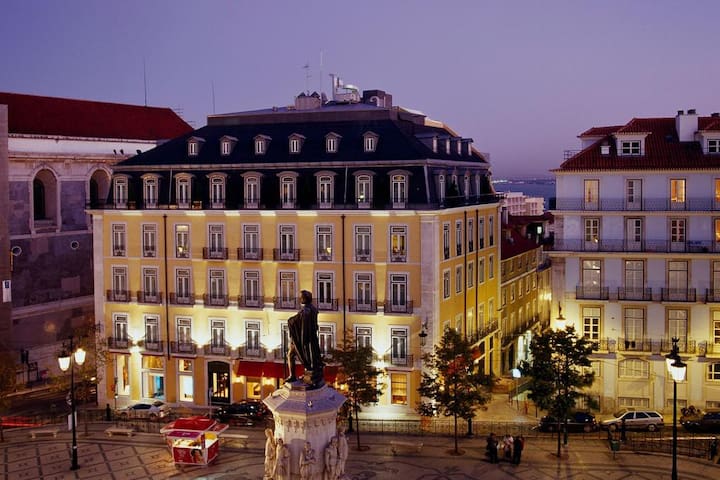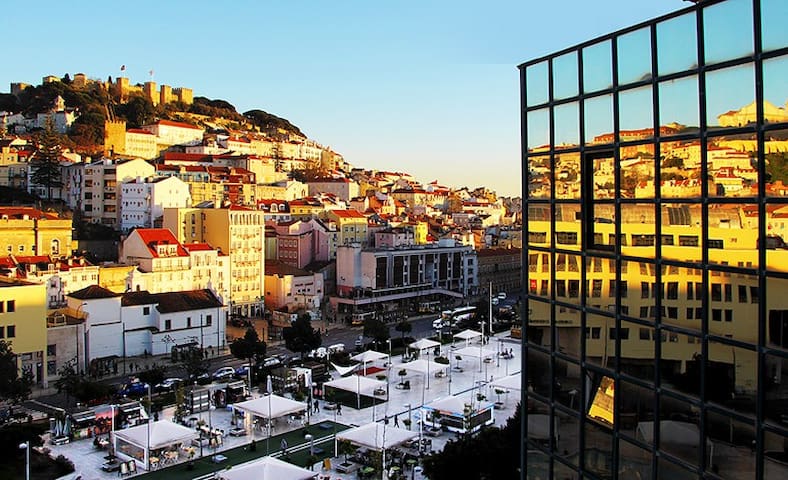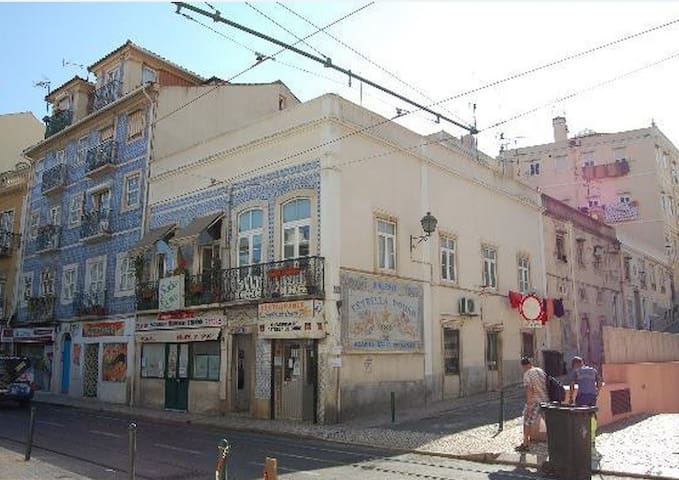Passeio turístico
Lisbon castle, magnificent view over the city and the river.
This medieval fortress is one of the most visited monuments in Lisbon. It's located on one of the highest hills of Lisbon and has the best panoramic views of the city and the Tagus river estuary. This historic building was once inhabited by Romans, Visigoth, Moors, and lastly by the Portuguese Royal Family from the 13th century up to the 16th. Currently, Castelo de São Jorge attracts over a million visitors.
1774 íbúar mæla með
São Jorge kastali
Rua de Santa Cruz do CasteloLisbon castle, magnificent view over the city and the river.
This medieval fortress is one of the most visited monuments in Lisbon. It's located on one of the highest hills of Lisbon and has the best panoramic views of the city and the Tagus river estuary. This historic building was once inhabited by Romans, Visigoth, Moors, and lastly by the Portuguese Royal Family from the 13th century up to the 16th. Currently, Castelo de São Jorge attracts over a million visitors.
The monumental Jeronimos Monastery is definitely one of Lisbon's top attractions. It was the most visited monument in Portugal in 2015 and it still is top of the list. It was built to celebrate Portuguese sailors' arrival in India in the 16th century and it sits right in front of the Tagus.
894 íbúar mæla með
Hieronymosar klaustur
The monumental Jeronimos Monastery is definitely one of Lisbon's top attractions. It was the most visited monument in Portugal in 2015 and it still is top of the list. It was built to celebrate Portuguese sailors' arrival in India in the 16th century and it sits right in front of the Tagus.
This Lisbon icon is also connected to the Discoveries period. It's a watchtower built where the first ships first departed from en route to India. The beauty of its Manueline architecture and its historical importance make it one of the best places to visit in Lisbon and one of its top attractions.
866 íbúar mæla með
Belém turninn
Av. BrasíliaThis Lisbon icon is also connected to the Discoveries period. It's a watchtower built where the first ships first departed from en route to India. The beauty of its Manueline architecture and its historical importance make it one of the best places to visit in Lisbon and one of its top attractions.
The most beautiful view in the city and the highest point in Lisbon. Beautiful relaxing spot.
849 íbúar mæla með
Utsýnið yfir Drottningu Monte
Largo MonteThe most beautiful view in the city and the highest point in Lisbon. Beautiful relaxing spot.
Graça viewpoint, formally known as Sophia de Mello Breyner Andresen viewpoint, is situated in the square of the same name. The panoramic view from this viewpoint allows to see from São Jorge Castle to the river, from Mouraria to Baixa Pombalina, to the colorful houses of Lisbon, the streets and gardens.
316 íbúar mæla með
Sophia de Mello Breyner Andresen útsýnispallur
Calçada da GraçaGraça viewpoint, formally known as Sophia de Mello Breyner Andresen viewpoint, is situated in the square of the same name. The panoramic view from this viewpoint allows to see from São Jorge Castle to the river, from Mouraria to Baixa Pombalina, to the colorful houses of Lisbon, the streets and gardens.
The museum has an impressive modern art collection. The best classical music concerts are here. Both the building and famous garden worth a visit.
779 íbúar mæla með
Calouste Gulbenkian safn
45A Av. de BernaThe museum has an impressive modern art collection. The best classical music concerts are here. Both the building and famous garden worth a visit.
The Alfama is the oldest district of Lisbon, spreading on the slope between the São Jorge Castle and the Tejo river. Its name comes from the Arabic Al-hamma, meaning "hot fountains" or "baths". It contains many important historical attractions, as well as an abundance of Fado bars and restaurants.
829 íbúar mæla með
Alfama
The Alfama is the oldest district of Lisbon, spreading on the slope between the São Jorge Castle and the Tejo river. Its name comes from the Arabic Al-hamma, meaning "hot fountains" or "baths". It contains many important historical attractions, as well as an abundance of Fado bars and restaurants.
It was the heart of romantic and bourgeois 19th century Lisbon. Its famous night life is unique, you can stroll from bar to bar with a great atmosphere in all of them. During the day Bairro Alto and Chiado always have a lot of movement, it is a fantastic place for walking and shopping.
1835 íbúar mæla með
Bairro Alto
21 Tv. InglesinhosIt was the heart of romantic and bourgeois 19th century Lisbon. Its famous night life is unique, you can stroll from bar to bar with a great atmosphere in all of them. During the day Bairro Alto and Chiado always have a lot of movement, it is a fantastic place for walking and shopping.
Its construction began in the second half of the twelfth century, after the conquest of the city from the Moors by D. Afonso Henriques, and today presents itself as a mixture of architectural styles. It has been classified as a National Monument since 1910.
517 íbúar mæla með
Lisabon dómkirkja
1 Largo da SéIts construction began in the second half of the twelfth century, after the conquest of the city from the Moors by D. Afonso Henriques, and today presents itself as a mixture of architectural styles. It has been classified as a National Monument since 1910.
The National Pantheon, located in the historic area of Santa Clara, occupies the building originally intended for the church of Santa Engrácia, hosting the tombs of large figures of Portuguese history. Near the place is held on Tuesdays and Saturdays, the traditional Feira da Ladra.
270 íbúar mæla með
Kirkja Santa Engrácia
Campo de Santa ClaraThe National Pantheon, located in the historic area of Santa Clara, occupies the building originally intended for the church of Santa Engrácia, hosting the tombs of large figures of Portuguese history. Near the place is held on Tuesdays and Saturdays, the traditional Feira da Ladra.
Initiated during the 16th century, while Philip II of Spain was ruling Portugal as Philip I, the Monastery of São Vicente de Fora became one of the best examples of the manierism style in Portugal. Before that, in this exact place, there was a Monastery of the same name, commissioned by Afonso I of Portugal in 1147, as thanksgiving for the conquering of Lisbon to the Moors on that same year. Today the Monastery is the Lisbon Patriarchate's headquarters.
10 íbúar mæla með
Church of São Vicente of Fora
Largo de São VicenteInitiated during the 16th century, while Philip II of Spain was ruling Portugal as Philip I, the Monastery of São Vicente de Fora became one of the best examples of the manierism style in Portugal. Before that, in this exact place, there was a Monastery of the same name, commissioned by Afonso I of Portugal in 1147, as thanksgiving for the conquering of Lisbon to the Moors on that same year. Today the Monastery is the Lisbon Patriarchate's headquarters.
The convent and church of Our Lady of Grace were built in 1291, but didn't survive the 1755 earthquake. They were rebuilt in the Baroque style -- the convent with a beautiful cloister and 18th-century tile panels; the church with gilded woodwork and grisaille paintings.
33 íbúar mæla með
Igreja e Convento da Graça
94 Largo da GraçaThe convent and church of Our Lady of Grace were built in 1291, but didn't survive the 1755 earthquake. They were rebuilt in the Baroque style -- the convent with a beautiful cloister and 18th-century tile panels; the church with gilded woodwork and grisaille paintings.
Museu Nacional de Arte Antiga is the most important art museum from the 12th to the 19th centuries in Portugal, hosting the most relevant public collection of ancient art in the country.
781 íbúar mæla með
Þjóðminjasafn Portúgals
Rua das Janelas VerdesMuseu Nacional de Arte Antiga is the most important art museum from the 12th to the 19th centuries in Portugal, hosting the most relevant public collection of ancient art in the country.
The MAAT - Museum of Art, Architecture and Technology reflects the ambition to present national and international exhibitions with the contribution of contemporary artists, architects and thinkers. It offers a new cultural and landscape boost to the city of Lisbon. The diversity of programs and spaces make it an important point in the city's cultural itinerary.
529 íbúar mæla með
MAAT
Avenida BrasíliaThe MAAT - Museum of Art, Architecture and Technology reflects the ambition to present national and international exhibitions with the contribution of contemporary artists, architects and thinkers. It offers a new cultural and landscape boost to the city of Lisbon. The diversity of programs and spaces make it an important point in the city's cultural itinerary.
O Palácio Nacional da Ajuda , a national monument since 1910, is not only the former royal dwelling and decorative arts museum, it is also the seat of other Portuguese institutions linked to culture and stage of protocol ceremonies.
178 íbúar mæla með
Þjóðpallurinn í Ajuda
Largo da AjudaO Palácio Nacional da Ajuda , a national monument since 1910, is not only the former royal dwelling and decorative arts museum, it is also the seat of other Portuguese institutions linked to culture and stage of protocol ceremonies.
O Santuário Nacional do Cristo Rei is located at an altitude of 133 meters above the Tejo river, consisting of a portico designed by the 75-meter-high architect Antonio Lino, topped by the statue of the Santissimo Redentor with open arms facing the Lisbon city.
296 íbúar mæla með
Þjóðlegur helgidómur Krists konungs
Avenida do Cristo ReiO Santuário Nacional do Cristo Rei is located at an altitude of 133 meters above the Tejo river, consisting of a portico designed by the 75-meter-high architect Antonio Lino, topped by the statue of the Santissimo Redentor with open arms facing the Lisbon city.
Lisbon's most important square: the Praça do Comércio was for decades Lisbon's main entrepôt, and crucial for its maritime trade. It was built on the site where the old Royal Palace used to exist before it was destroyed by the earthquake of 1755. On the river bank, near the square, is the Cais de Sodré ferry terminal from which several ferries depart down the Tagus River.
717 íbúar mæla með
Viðskiptatorg
Praça do ComércioLisbon's most important square: the Praça do Comércio was for decades Lisbon's main entrepôt, and crucial for its maritime trade. It was built on the site where the old Royal Palace used to exist before it was destroyed by the earthquake of 1755. On the river bank, near the square, is the Cais de Sodré ferry terminal from which several ferries depart down the Tagus River.
It was in this area that the Moors went to live after the conquest of Lisbon by D. Afonso Henriques in 1147 until they were expelled in the 15th century. From that time few traces remain, however Mouraria is still today the most multicultural neighborhood of the city.
45 íbúar mæla með
Moorish Quarter
It was in this area that the Moors went to live after the conquest of Lisbon by D. Afonso Henriques in 1147 until they were expelled in the 15th century. From that time few traces remain, however Mouraria is still today the most multicultural neighborhood of the city.
This Lisbon icon opened in 1902 and has since connected Baixa with Chiado. The Elevador de Santa Justa is 45 meters high and is one of Lisbon's top attractions. It is one of the most visited and most photographed monuments in the city. It offers a 360-degree view from the top to downtown Lisbon and it was built using the same techniques and materials as the Eiffel Tower.
626 íbúar mæla með
Santa Justa Lyfta
R. do OuroThis Lisbon icon opened in 1902 and has since connected Baixa with Chiado. The Elevador de Santa Justa is 45 meters high and is one of Lisbon's top attractions. It is one of the most visited and most photographed monuments in the city. It offers a 360-degree view from the top to downtown Lisbon and it was built using the same techniques and materials as the Eiffel Tower.
Cais das Colunas is one of Lisbon's most visited sights. This beautiful quay right in front of Terreiro do Paço is the ideal place to enjoy a drink while watching the sun set. Its view of the river and the south margin is unparallelled and worth admiring.
It was also through here that prominent political figures first set foot in Lisbon, such as HM Queen Elizabeth II.
25 íbúar mæla með
Cais das Colunas
Praça do ComércioCais das Colunas is one of Lisbon's most visited sights. This beautiful quay right in front of Terreiro do Paço is the ideal place to enjoy a drink while watching the sun set. Its view of the river and the south margin is unparallelled and worth admiring.
It was also through here that prominent political figures first set foot in Lisbon, such as HM Queen Elizabeth II.
It takes but 40 minutes to get to Sintra by train. This charming green town has several attractions. The main one is the Pena Palace, but you can also visit the Moorish Castle, Palácio da Vila, Monserrate Palace, Quinta da Regaleira and Convento dos Capuchos. Besides these monuments, the town of Sintra is very beautiful and is full of interesting nooks and passageways. Stop at Piriquita to grab a travesseiro or a queijada, very typical delicacies.
1254 íbúar mæla með
Sintra
It takes but 40 minutes to get to Sintra by train. This charming green town has several attractions. The main one is the Pena Palace, but you can also visit the Moorish Castle, Palácio da Vila, Monserrate Palace, Quinta da Regaleira and Convento dos Capuchos. Besides these monuments, the town of Sintra is very beautiful and is full of interesting nooks and passageways. Stop at Piriquita to grab a travesseiro or a queijada, very typical delicacies.
Cascais is a town by the sea, situated between the Atlantic Ocean and the Serra de Sintra, which is an important tourist destination. With inviting beaches, water sports, a rich historical and cultural heritage, a majestic landscape and nightlife, Cascais has everything to please anyone who stays there. Take a walk along the seawall that runs from São João do Estoril to Cascais, visit the historic center of Cascais and its typical streets and stop to admire the beauty of Cascais Bay.
724 íbúar mæla með
Cascais
Cascais is a town by the sea, situated between the Atlantic Ocean and the Serra de Sintra, which is an important tourist destination. With inviting beaches, water sports, a rich historical and cultural heritage, a majestic landscape and nightlife, Cascais has everything to please anyone who stays there. Take a walk along the seawall that runs from São João do Estoril to Cascais, visit the historic center of Cascais and its typical streets and stop to admire the beauty of Cascais Bay.
It was called the "Portuguese Riviera", as Estoril was the place where the wealthy and famous escaped to during the 2nd World War. At that time, large hotels and the largest casino in Europe were built in Estoril. There are good beaches like Tamariz, as well as great mansions, world-class golf courses and a car racing track.
105 íbúar mæla með
Estoril
It was called the "Portuguese Riviera", as Estoril was the place where the wealthy and famous escaped to during the 2nd World War. At that time, large hotels and the largest casino in Europe were built in Estoril. There are good beaches like Tamariz, as well as great mansions, world-class golf courses and a car racing track.
This neoclassical theatre is located in Rossio, in Praça D. Pedro IV. It was founded in 1846, on the regent queen's 27th birthday, hence the name Dona Maria II. A terrible fire destroyed the inside of the theater in 1964, which was rebuilt and reopened in 1978. Many of the plays are subtitled in English, being accessible to everyone
147 íbúar mæla með
Teatro Nacional Dona Maria II
Praça Dom Pedro IVThis neoclassical theatre is located in Rossio, in Praça D. Pedro IV. It was founded in 1846, on the regent queen's 27th birthday, hence the name Dona Maria II. A terrible fire destroyed the inside of the theater in 1964, which was rebuilt and reopened in 1978. Many of the plays are subtitled in English, being accessible to everyone
Teatro de São Carlos is Lisbon's Opera House, after the original was destroyed in the 1755 earthquake. On the inside, its acoustic is flawless, much like the decoration, in a rococo style. On the inside, it bears resemblance to San Carlo Theater in Naples, while on the outside it reminds os of La Scala in Milan. It's located in Chiado.
105 íbúar mæla með
Þjóðleikhúsið í São Carlos
9 R. Serpa PintoTeatro de São Carlos is Lisbon's Opera House, after the original was destroyed in the 1755 earthquake. On the inside, its acoustic is flawless, much like the decoration, in a rococo style. On the inside, it bears resemblance to San Carlo Theater in Naples, while on the outside it reminds os of La Scala in Milan. It's located in Chiado.
Teatro São Luíz heater opened in 1894, under the name of Teatro Dona Amelia. Nowadays, Teatro São Luís is one of the most important Lisbon art venues. In 1998 it was renovated and expanded and in 1990 it was granted by the city of Lisbon to the Chiado Theatre Company and Mario Viegas, who has been developing various cultural activities ever since.
35 íbúar mæla með
Teatro Municipal Sao Luiz
38 R. António Maria CardosoTeatro São Luíz heater opened in 1894, under the name of Teatro Dona Amelia. Nowadays, Teatro São Luís is one of the most important Lisbon art venues. In 1998 it was renovated and expanded and in 1990 it was granted by the city of Lisbon to the Chiado Theatre Company and Mario Viegas, who has been developing various cultural activities ever since.
It is one of the largest shopping centres in Europe, with more than 340 shops, and a common meeting spot for locals. Its decoration invokes the Portuguese Discoveries and it is a must visit for those who come to Lisbon. In Colombo Shopping centre, you will find stores like Fnac, Sephora, MAC Cosmetics, Disney Store, Rolex, Michael Kors, Longchamp, among many others. In this space, there are more than 60 restaurants, cinemas with an IMAX room and recreational areas where you can play bowling.
500 íbúar mæla með
Centro Colombo
Avenida LusíadaIt is one of the largest shopping centres in Europe, with more than 340 shops, and a common meeting spot for locals. Its decoration invokes the Portuguese Discoveries and it is a must visit for those who come to Lisbon. In Colombo Shopping centre, you will find stores like Fnac, Sephora, MAC Cosmetics, Disney Store, Rolex, Michael Kors, Longchamp, among many others. In this space, there are more than 60 restaurants, cinemas with an IMAX room and recreational areas where you can play bowling.
It was one of the first of Lisbon's shopping centres and it opened in 1985. It remains a locals favourite. The Amoreiras is located in a noble and central area of the city and has more than two hundred stores, spread over two floors in different areas: fashion, beauty, jewellery, communication and information services. It also has a cinema and a restaurant area with a wide variety of restaurants, as well as a viewpoint on top, which opened in 2016.
266 íbúar mæla með
Amoreiras verslunarmiðstöð
Avenida Engenheiro Duarte PachecoIt was one of the first of Lisbon's shopping centres and it opened in 1985. It remains a locals favourite. The Amoreiras is located in a noble and central area of the city and has more than two hundred stores, spread over two floors in different areas: fashion, beauty, jewellery, communication and information services. It also has a cinema and a restaurant area with a wide variety of restaurants, as well as a viewpoint on top, which opened in 2016.
Freeport is the largest outlet in Europe and certainly one of the best in the country, bringing together various worldwide famous brands. It is outside the center of Lisbon, in Alcochete, but worth the visit. We recommend saving an afternoon for it. There is a lot on offer at this Lisbon outlet, not only clothes shops but also decoration, ceramics, and cosmetics ones.
At Freeport you will find brands such as Carolina Herrera, Calvin Klein, Burberry, Purificación Garcia, Vista Alegre, Mango, Hugo Boss, Guess, Lacoste, Benetton, Adidas, Asics, Converse, Nike, Puma, Samsonite, Desigual, Diesel, Pepe Jeans, Quiksilver and Chico at much more affordable prices.
To get to Freeport you can take the shuttle bus from Marquês de Pombal, at 10 am, or from Hotel Mundial in Martim Moniz, at 10h15 am. This will cost 10€ for a round trip, but it gives you 10% off a selection of shops. Also, you can drive across the Vasco da Gama bridge, or take a bus from Gare do Oriente.
112 íbúar mæla með
Freeport Lisboa Fashion Outlet
2004 Av. EuroFreeport is the largest outlet in Europe and certainly one of the best in the country, bringing together various worldwide famous brands. It is outside the center of Lisbon, in Alcochete, but worth the visit. We recommend saving an afternoon for it. There is a lot on offer at this Lisbon outlet, not only clothes shops but also decoration, ceramics, and cosmetics ones.
At Freeport you will find brands such as Carolina Herrera, Calvin Klein, Burberry, Purificación Garcia, Vista Alegre, Mango, Hugo Boss, Guess, Lacoste, Benetton, Adidas, Asics, Converse, Nike, Puma, Samsonite, Desigual, Diesel, Pepe Jeans, Quiksilver and Chico at much more affordable prices.
To get to Freeport you can take the shuttle bus from Marquês de Pombal, at 10 am, or from Hotel Mundial in Martim Moniz, at 10h15 am. This will cost 10€ for a round trip, but it gives you 10% off a selection of shops. Also, you can drive across the Vasco da Gama bridge, or take a bus from Gare do Oriente.
This cultural space has a permanent exhibition, a temporary exhibition space, a documentation center, a thematic store, an auditorium, a restaurant and the Museum School, where Portuguese guitar and Fado guitar courses are taught, and where It is possible to attend a seminar for lyricists. The school also has a rehearsal office for interpreters.
518 íbúar mæla með
Fado safn
1 Largo do Chafariz de DentroThis cultural space has a permanent exhibition, a temporary exhibition space, a documentation center, a thematic store, an auditorium, a restaurant and the Museum School, where Portuguese guitar and Fado guitar courses are taught, and where It is possible to attend a seminar for lyricists. The school also has a rehearsal office for interpreters.
The Chinese Pavilion is just minutes from Bairro Alto and is worth visiting. It is one of the classic bars in one of the busiest areas of Lisbon night. Since 1986 it surprises those who come in with its decoration. There are five rooms full of collectors' items, which delight any antique dealer. It is a true small museum that includes collections of military helmets, aircraft models, lead soldiers, sculptures, among other gems, etc! It is really a converted bar museum.
299 íbúar mæla með
Pavilhao Chines
89 R. Dom Pedro VThe Chinese Pavilion is just minutes from Bairro Alto and is worth visiting. It is one of the classic bars in one of the busiest areas of Lisbon night. Since 1986 it surprises those who come in with its decoration. There are five rooms full of collectors' items, which delight any antique dealer. It is a true small museum that includes collections of military helmets, aircraft models, lead soldiers, sculptures, among other gems, etc! It is really a converted bar museum.
The Carmo Convent is a powerful reminder of the 1755 earthquake. The walls of this Gothic church remained standing, but the roof and arches collapsed. It is best to visit the church in the early morning while the sun illuminates the deserted floor, giving it a contemplative air.
222 íbúar mæla með
Karmo klaustur
27 Largo do CarmoThe Carmo Convent is a powerful reminder of the 1755 earthquake. The walls of this Gothic church remained standing, but the roof and arches collapsed. It is best to visit the church in the early morning while the sun illuminates the deserted floor, giving it a contemplative air.
It has a unique collection of coaches, with fine 18th century specimens exuberantly decorated with paintings and gilded carving.
483 íbúar mæla með
Þjóðarsafn Bíla
136 Av. da ÍndiaIt has a unique collection of coaches, with fine 18th century specimens exuberantly decorated with paintings and gilded carving.
Lisbon is a city with a strong connection to the sea, the only European capital with Atlantic beaches. Therefore, it is essential to take a walk along the coast or even make a few days of beach. With golden dunes and mountain ranges in the background, you can surf, sail, windsurf, or even golf by the sea on world-class courses. In Lisbon there are the beaches of the Cascais line for those who follow the Tagus to the Atlantic, and Costa da Caparica on the south bank, which extends to the Alentejo coast.
26 íbúar mæla með
Santo Amaro de Oeiras beach
Lisbon is a city with a strong connection to the sea, the only European capital with Atlantic beaches. Therefore, it is essential to take a walk along the coast or even make a few days of beach. With golden dunes and mountain ranges in the background, you can surf, sail, windsurf, or even golf by the sea on world-class courses. In Lisbon there are the beaches of the Cascais line for those who follow the Tagus to the Atlantic, and Costa da Caparica on the south bank, which extends to the Alentejo coast.
At the end of the day to continue the night and dance, Cais do Sodré is one of the busiest options of the moment. This area of bars named after northern European capitals and distant countries that for decades amused the sailors arriving at the port of Lisbon is now one of the most laid back of Lisbon's nightlife, with cultural venues, restaurants, bars, clubs and nightclubs.
6 íbúar mæla með
Cais do Sodré
Cais do SodréAt the end of the day to continue the night and dance, Cais do Sodré is one of the busiest options of the moment. This area of bars named after northern European capitals and distant countries that for decades amused the sailors arriving at the port of Lisbon is now one of the most laid back of Lisbon's nightlife, with cultural venues, restaurants, bars, clubs and nightclubs.
The heart of urban and cosmopolitan glamor can still be felt in Chiado, a place where the "new" and the "old" live in harmony. Characterized by its casual-chic ambience, with its streets full of shops, fine dining, beautiful Portuguese sidewalks, beautiful churches and timeless cafes, Chiado makes any visitor feel like a true Lisboner.
71 íbúar mæla með
Chiado
The heart of urban and cosmopolitan glamor can still be felt in Chiado, a place where the "new" and the "old" live in harmony. Characterized by its casual-chic ambience, with its streets full of shops, fine dining, beautiful Portuguese sidewalks, beautiful churches and timeless cafes, Chiado makes any visitor feel like a true Lisboner.
Located on the highest hill in the city of Lisbon, it is one of the oldest and most beautiful neighborhoods of the capital. It is a neighborhood of working-class villages such as Vila Estrela de Ouro, built in 1908, or Vila Berta, built between 1902 and 1908.
From the 16th century, several palaces began to be built, such as the Counts of Vale dos Reis (now Vila Sousa), António Ribeiro Barros (near the Monicas Convent), the Figueira Palace (Caça da Graça) and the of the Lords of Trofa.
The area is known and sought after by its viewpoints, where you can enjoy one of the most beautiful views of the city.
Rua da Graça
Rua da GraçaLocated on the highest hill in the city of Lisbon, it is one of the oldest and most beautiful neighborhoods of the capital. It is a neighborhood of working-class villages such as Vila Estrela de Ouro, built in 1908, or Vila Berta, built between 1902 and 1908.
From the 16th century, several palaces began to be built, such as the Counts of Vale dos Reis (now Vila Sousa), António Ribeiro Barros (near the Monicas Convent), the Figueira Palace (Caça da Graça) and the of the Lords of Trofa.
The area is known and sought after by its viewpoints, where you can enjoy one of the most beautiful views of the city.
Borgartillaga
Samgöngur
Travel on tram 28
It is one of the best ways to travel through the historic neighborhoods. It looks good on any photo and the sound of the tram running on the rails is one of the most characteristic of the city. Tram 28's carriages ride through the hills of Bairro Alto, Baixa, Graça and even Alfama and are one of the most popular attractions in the city.

